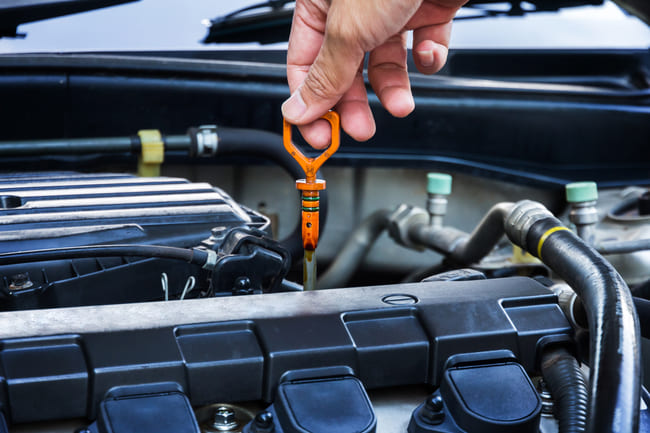Using high-quality motor oil not only forms a protective layer against rapid engine wear and corrosion, it also has a cooling effect and acts as a cleaner by preventing buildups of contaminants on the moving parts of the engine. How much engine oil your car consumes will depend on several factors, such as the type and size of the engine, the age and condition of the vehicle, and the driving conditions.
It is not wise to go below the minimum recommended amount of oil or drive the car with an overfilled oil tank. Both extremes have a negative effect on the service life of the components. Find out more about this below.
How much engine oil do I need?
The majority of vehicle engines use between 5 and 8 quarts of oil, however, this varies between make and model. Small 4-cylinder engines will need much less than a large 8-cylinder engine, which you might find on a sports car or SUV.
Whatever the maximum oil capacity of your car engine is, it’s best to maintain the oil levels between the minimum and maximum marks as adding too much or too little can be very harmful. When carefully topping up with fresh oil, make sure to use the car engine dipstick or monitoring system to periodically check how much is in the tank as you go along.
Here is a general comparison of the oil capacities of different popular models:
| Make | Model | Engine size | Oil quantity (l) |
| Audi | Q3 | 2.0L TFSI | 5.0 - 5.5 |
| Q5 | 2.0L TFSI | 5.0 - 5.5 | |
| Q7 | 3.0L TFSI | 7.7 | |
| Chevrolet | Silverado | 5.3L V8 | 6.6 |
| Vortec | 5.7L V8 | 5.7 | |
| Equinox | 1.5L I4 | 5.0 | |
| Impala | 3.6L V6 | 5.7 | |
| Ford | Escape | 2.0L EcoBoost | 5.7 |
| Powerstroke | 6.7L V8 | 12.0 | |
| Nissan | Altima | 2.5L I4 | 4.7 |
| Sentra | 1.8L I4 | 4.3 | |
| Volkswagen | Up | 1.0L I3 | 3.6 |
| Touran | 1.6L TDI | 4.3 | |
| Vauxhall | Zafira | 1.8L I4 | 4.5 |
| Mitsubishi | L200 | 2.4L I4 | 7.5 |
| Mercedes | Compressor | 1.8L I4 | 5.5 |
Please note: if it is time to change your engine oil, it’s a good idea to buy an oil filter and change them at the same time. This ensures that the new lubricant is as clean as possible and able to flow more freely.
What happens if I put in too much or too little oil?

If the oil levels are too low, your engine won’t be sufficiently lubricated and therefore friction will increase between the moving parts, leading to premature wear, overheating, and engine failure. At the other end of the scale, too much oil can cause the tank to overflow and leak into the combustion chambers and burn, causing an increase in temperature and potentially damaging the catalytic converter. There may also be a significant increase in pressure and oil foaming.
Using the wrong type of oil is equally as harmful due to the importance of the oil’s thickness at different operating temperatures. For example, if your vehicle’s owner’s manual specifies that you should use 5W 30 engine oil, you should not attempt to use 10W 30 oil as the viscosity will be too high in cold temperatures, meaning that it will not flow enough to protect the metal components. If the viscosity is too low, it will also not provide adequate protection against friction and harsh operating conditions.
How much oil to put in a car
For example, if you want to know exactly how much engine oil a Peugeot 208 can take, the most reliable source of information would be the vehicle owner’s manual or repair manual for the specific vehicle model. You should find the oil capacity along with the recommended type of oil and the recommended change interval.
Otherwise, you could ask for advice from a professional mechanic. If you can’t find your manual, there are also online oil finders or product catalogues that can help you find the exact oil you need although they may not provide as much information concerning the engine’s capacity.
Top products related to this topic:












































